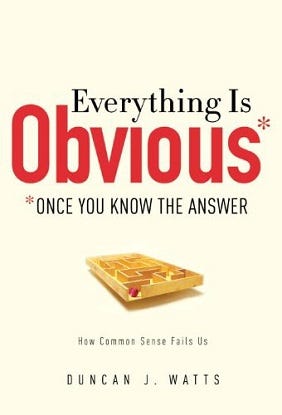The Failures Of Common Sense

A review of _Everything is Obvious: Once You Know the Answer
The message of Everything is Obvious by Duncan Watts can be summed up as: “everything you tell yourself about the past is false.” We humans have a tendency to frame events as narratives and see patterns where none exist. Therefore, when we look at the past, we see a single story line leading to an inevitable conclusion when in reality, history is a tangled mess of individual actions. It is only many years after the fact, when we examine historical occurrences with the bias of hindsight does a clear narrative emerge.
As an example, take some of the most famous battles in history: Gettysburg, the Battle of the Bulge, the D-Day landings. We think of these as a single event with one storyline — the heroic Allies storm the beaches and sweep through France — when to the soldiers on the ground at the time, everything was chaos. Our common sense — and popular media — have conditioned us to look for the story among the individual events, leading us to assume history is obvious. During a battle, a soldier is only conscious of his/her individual actions and has no sense of the broader state of the war. An Allied fighter on D-Day was concerned only with his survival and the eventual liberation of France was certainly not inevitable as it may appear to us today. Considered the current situation of political disagreements and fractured public opinion. 100 years from now, future historians will look back and tell a single narrative about these time, even though to us at the moment there is no clear story. Our natural inclination for patterns makes the storyline of the past obvious after the fact, but to everyone on the ground, nothing makes much sense.
 No obvious conclusion from this perspective (Source)
No obvious conclusion from this perspective (Source)
The phenomenon of concluding the outcome of past events was inevitable extends beyond battles and history. Looking back at Google, we think it’s obvious it would grow into a dominate technology company because clearly it had a great search engine, visionary executives, and top talent. However, it is only looking back at history that we construct this tale, and our explanation of how Google succeeded in lacking. In effect, we say that Google succeeded because it had the characteristics of Google, which is a prime example of circular reasoning. Infoseek could just as easily have become the dominant search provider and we would be telling the exact same story about the small team that grew into one of the most valuable companies in the world except with Google replaced by Infoseek. We have the same narrative bias when we think about popular media. We look at the success of Harry Potter and say that clearly in the 1990s-2000s the public had a taste for fictional stories of underdog boy wizards heading off to school with a cast of relatable characters. However, at the time no one would have made this prediction because it clearly was not obvious! Moreover, saying Harry Potter was massively successful because it had the elements of Harry Potter does not explain anything!
Another failure of common sense is that we like to believe the world is ordered. This means we do not acknowledge the critical role played by randomness in determining which storyline plays out or which companies, books, songs, and even art become successful. The Mona Lisa is the most famous painting in the world and common opinion holds that it is revered because enigmatic subject or captivating style. Yet this overlooks the fact that over the centuries, there have been literally hundreds of thousands of other unique paintings that never caught the public imagination. There is nothing special about the Mona Lisa, and it was only because of a series of random events (including the stealing of the painting) 400 years after it was painted that it became popular. Studies that examine how songs become hits have shown the role of randomness in popularity. When subjects were not given any popularity information about the songs, the number of times they listened to each song varied among participants, and with no stand outs. However, when subjects were told ahead of time which songs were “popular”, they tended to listen to these more which then influenced other subjects to listen to these songs and so on. The researchers could effectively manipulate which songs would hit the top of the charts by assigning them arbitrary popularities!
 Talent or Randomness?
Talent or Randomness?
The phenomenon illustrated in this study is called cumulative advantage. Once a piece of media or a company gains a small advantage, its success becomes a self-reinforcing cycle. Google had a small lead in search, which led to more people using Google, which led to more traffic and better results which caused more people to search with Google until the company dominates. Individuals born into wealthier families start out with a slight lead, which they then can build on to accumulate a greater fortune until eventually we reach a point where the top 0.1% control more wealth than the bottom 90%. By downplaying the effects of randomness and initial advantage in success, we paint a false narrative that anyone can succeed with the right amount of effort. We all have heard stories of the business leader from an impoverished background who through her own sheer effort of will was able to lead a triumphant life. Yet these are noteworthy precisely because they are expectations! Especially in the individualist United States, we hear that people simply need to work hard to do well, which prevents us from addressing the real issues, such as education and segregated neighborhoods that lead to such wide disparities of wealth.
Common sense is not a completely negative part of our lives, but it was more suited to making rapid decisions to avoid predators rather than rational choices where we must consider vast quantities of information. Once we come to realize where common sense fails us, we can start to think differently about the past and our own situation. Rather than one clear story leading to a predestined outcome, the past is a tangled collection of individual paths, any of which could have become the dominant storyline. Therefore, when we consider our current position, we have to realize there are more choices available to us than we can see. We are not doomed to environmental catastrophe or to an eventual collapse of the economy if we choose to take corrective actions. The people claiming that society is disintegrating are certainly not the ones working to make the world a better place to live!
Recommendation
I judge a book by whether or not I can get all the ideas in a five minute summary, or if reading it entirely is worth it for the details. Everything is Obvious makes the recommended list because it backs up all the phenomenon I’ve mentioned with real examples and studies. It is a rather short book, but manages to cover many important topics such as confirmation bias, the narrative fallacy, and cumulative advantage. In hindsight, this book was well worth my time, or at least that’s the story I like to tell myself!